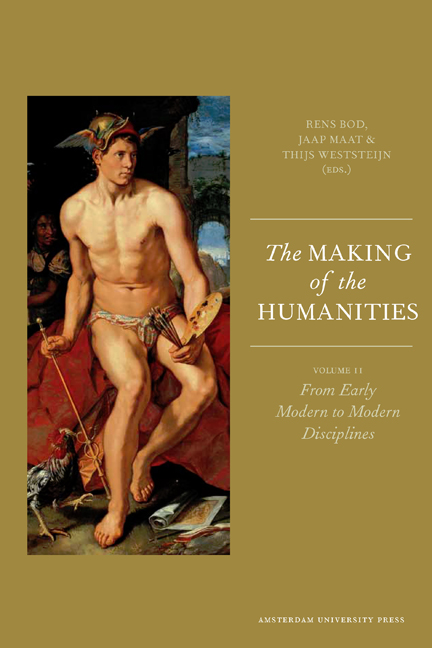Book contents
- Frontmatter
- Contents
- Introduction: The Dawn of the Modern Humanities
- I Linguistics and Philology
- II The Humanities and the Sciences
- III Writing History and Intellectual History
- IV The Impact of the East
- V Artworks and Texts
- VI Literature and Rhetoric
- VII Academic Communities
- Contributors
- List of Figures
- Index
The Rise of General Linguistics as an Academic Discipline: Georg von der Gabelentz as a Co-Founder
Published online by Cambridge University Press: 19 January 2021
- Frontmatter
- Contents
- Introduction: The Dawn of the Modern Humanities
- I Linguistics and Philology
- II The Humanities and the Sciences
- III Writing History and Intellectual History
- IV The Impact of the East
- V Artworks and Texts
- VI Literature and Rhetoric
- VII Academic Communities
- Contributors
- List of Figures
- Index
Summary
Introduction
‘What is General Linguistics?’ The first full professor of General Linguistics at the University of Amsterdam, Anton Reichling (1898-1986), asked this question in 1947 in the title of his inaugural lecture. Reichling presented his audience with a bird’s-eye view of eight centuries of answers to his question, which he all regarded as wrong, mainly because of the attempt to find the ‘generality’ of general linguistics in the wrong place: either in aprioristic ideas on ‘general grammar’ (the earlier answers) or in reductionist appeals to non-linguistic principles (the later answers).
And yet, according to Reichling, one man had already been on the right track, that of ‘autonomous generality’, years ago. This man was Georg von der Gabelentz (1840-1893), and his answer can be found in his book Die Sprachwissenschaft, Ihre Aufgaben, Methoden und bisherigen Ergebnisse, first published in 1891. Reichling quoted a long passage from this book, in which Gabelentz envisages a new programme for language typology and which begins as follows:
(i) Every language is a system, of which all parts organically relate to and cooperate witheach other. One has to suppose that none of these parts may be lacking, or diff erent, without the whole being changed.
Reichling concluded that Ferdinand de Saussure (1857-1913), the founder of modern general linguistics, had an almost visionary predecessor.
Reichling's comments form a good starting point for the subject I want to explore, the rise of general linguistics, with a focus on Gabelentz. They are linked to the following facts and issues, all of which are relevant to this theme:
a) A European university established its first chair in General Linguistics as late as 1947.
b) Nevertheless, early varieties of general linguistics existed at least eight centuries before that.
c) The ‘generality’ of general linguistics has been conceived in very diff erent manners.
d) Saussure is regarded as the founder of modern general linguistics.
e)Gabelentz anticipated at least some of Saussure's ideas.
I begin by providing a brief elaboration of (a)-(d), which will involve a more precise demarcation of ‘general linguistics’ and an overview of the development of general linguistics thus defined.
- Type
- Chapter
- Information
- The Making of the HumanitiesVolume II: From Early Modern to Modern Disciplines, pp. 55 - 70Publisher: Amsterdam University PressPrint publication year: 2012
- 2
- Cited by



